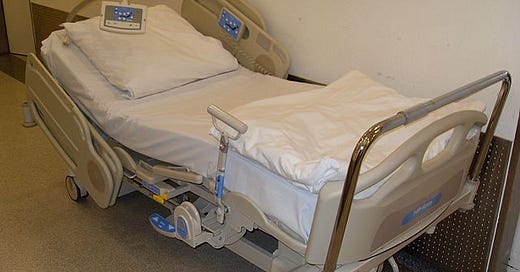"I'm sorry, but your emergency isn't my emergency."
Or a week spent in-and-out of Accident and Emergency...
I have just spent 50% of the last 5 days in Accident & Emergency (ER) / hospital. It was a chastening experience, and demonstrated just how much pressure the UK’s NHS is under, and how broken the entire healthcare chain is. When you spend a total of 21 hours in A&E, you see how many of the people using the service simply shouldn’t be there — but who presumably are because they can’t get responsive first-line GP treatment elsewhere. And with Social Care also shot to pieces, hospitals become cannon-fodder, the meat in the sandwich.
“Get yourself to hospital” we were told by telephone triage during my first episode, “there’s no point ringing for an ambulance”.
Whilst I realise my own malaise is not as critical as a heart attack or stroke etc., it’s still critical to me, especially when it has this profile (and ignoring the 9 ‘smaller’ episodes in the two weeks leading up to it):
Tuesday: 4-hour nose-bleed, eventually stopped in A&E during an 8 hour visit (the last three of which was spent waiting for a blood test & results). We got home at 4:30 a.m.
Wednesday: 2-hour bleed, again stopped in A&E; 4 hour visit.
Thursday: 9-hour bleed; 8 hours in A&E; admitted to a ward ‘for observation’; sent home yesterday with my nose packed and after no attempt to discover the root cause. “I cannot say it won’t happen again” said the senior doctor. Very reassuring.
The last episode is the most disappointing — largely because there was a chance to get to the bottom of things, to find out ‘why’ I was suffering. When I protested about being let home (it felt more like being thrown out) I was told by the same doctor “we need the bed” i.e. ‘your emergency is not important enough’; or ‘I have targets to hit’. The ward was a little like a busy railway station with all its ‘ins’ and ‘outs’. I felt sorry for the staff all working really hard under enormous pressure.
As a writer there was a great deal to be taken from the experience, of course, material for future stories. Constant observation was unavoidable — not only of process and the others stuck in the system, but of myself too. And after eventually being allocated a bed in a side-ward of eight men, there were the people sharing that space with me:
The eighty-something who was clearly suffering from some form of dementia alongside his physical travails, and who was given a prostate cancer diagnosis as I lay in the bed opposite him. He decided I was to be called “Howard”, and was some kind of architect who knew a couple of his friends. He would talk and sing to himself, was very Christian, prone to tears, and said he was looking forward to seeking his mother again. [There’s a whole novel right there.]
Or the ex-paratrooper (again c. 80) who said he had been operated on for no reason, was really low on Friday but a different man on Saturday when he was let out — but not before he’d demonstrated his attitudes to race and sexuality were firmly rooted in the 1970s.
The man in the next bed to me who’d been in hospital for 6 weeks and didn’t realise it. Men with tubes coming out of them, being fed through syringes, being injected in the thigh three times a day…
You can see what I mean about material for a writer…
Yes, I accept my case is not in their league, and I’m grateful that by-and-large I’m pretty healthy (ongoing heart issue aside) — but it is my case, and it is serious to me, and I want to be able to live my life without thinking my nose is going to explode if I bend over too quickly or when I’m driving along a motorway.
And now? As I sit here waiting for my temporary nasal packs to fall out (the moment of truth?), I have a bag ready and packed upstairs — just in case…




